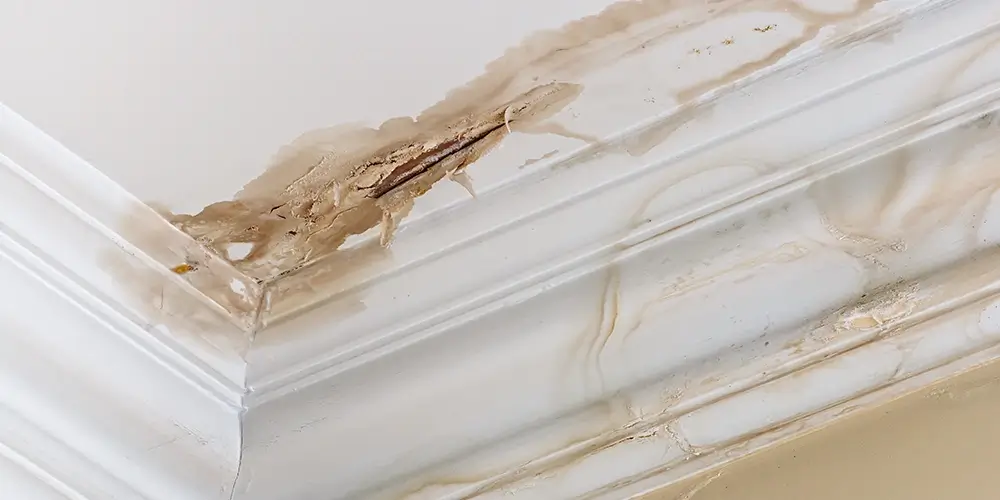A hidden water leak can do more than waste water — it can quietly cause significant damage to your home. But if you know what to look for, you can spot the warning signs before things get serious.
Catching a leak early can save you thousands of dollars in repairs, not to mention gallons of wasted water. Stay alert for the signs, and if you suspect a leak, shut off your main water supply and call a licensed plumber immediately.
Here are six clues indicating a leak might be lurking somewhere in your plumbing system.
1. Your Water Bill Suddenly Spikes
One of the clearest red flags of a leak is if your bill jumps unexpectedly, even though your water use hasn’t changed significantly.
Here’s how to test for a leak:
- Locate your water meter, usually in a box near the curb.
- Turn off all water sources so there are no running faucets, showers, or appliances.
- Check and record your meter reading.
- Wait for a few hours without turning on any water, then recheck the meter numbers.
If the numbers have increased, water is escaping somewhere, and it’s time for you to investigate further.
2. A Drop in Water Pressure
Does your once-powerful shower now feel more like a trickle? Or does your kitchen faucet barely flow? A sudden or gradual drop in water pressure often means water is escaping from your pipes before it reaches your fixtures.
There are a few other issues that can also cause low pressure, such as:
- Clogged or corroded pipes
- A faulty pressure-regulating valve
- Problems with the municipal water supply
If you’ve ruled those out, there is likely a leak in your system.
3. Mold, Mildew, or a Musty Smell
Mold and mildew thrive in moisture. Both are fungi that thrive in damp conditions, but mildew grows as a powdery, surface-level patch, while mold grows as a fuzzy, invasive colony and is more difficult to remove.
- Musty smells often indicate hidden moisture.
- Check under sinks, around tubs and showers, and near washers for dampness.
- After leaks are repaired, thoroughly clean up mold and mildew to prevent them from returning. Some molds are highly toxic and may require professional remediation.
Persistent dampness behind walls or under floors can lead to severe structural issues and health risks over time.
4. Visible Water Damage
Water can wreak havoc on your home. Keep an eye out for these warning signs:
- Peeling or bubbling paint or wallpaper
- Warped or soft floors (especially around sinks and tubs)
- Sagging ceilings or walls
- Rust or corrosion on exposed pipes
These aren’t just cosmetic problems—they’re signs that water has already gotten where it shouldn’t and is causing damage.
5. Strange Noises from Your Pipes
Your plumbing should be nearly silent. So if you hear unusual sounds, listen and observe closely:
- Dripping: Most likely, you have an active leak.
- Rattling or vibrations: If ignored, loose fittings can eventually cause leaks.
- Running water sounds: If no water is on and you still hear it, you may have a significant hidden leak.
6. Wet Spots or Lush Patches in the Yard
Leaks don’t always happen indoors. Underground water lines and irrigation pipes can also crack or burst.
Watch for:
- Random soggy spots or puddles when it hasn’t rained
- Unusually green, lush patches of grass in one area
- Cracks in pavement, patios, or driveways
Outdoor leaks can waste hundreds of gallons of water daily, so regular inspections of sprinkler systems and outdoor faucets are just as important as checking inside.
FAQs: Signs of a Water Leak
Q: What are the most common signs of water leaks?
Higher water bills, low pressure, mold or mildew, water stains, and running water sounds when all the water is turned off.
Q: How can I find a hidden leak myself?
You can perform the water meter test (above) or look for signs such as peeling paint, mold, or damp spots on walls and floors.
Q: What should I do if I find a leak?
Shut off your home’s main water valve immediately and call a professional plumber to locate and fix the problem.
Q: Can a small leak cause significant damage?
Absolutely. Even a slow drip can rot wood, grow mold, and waste gallons of water over time.
Q: What causes leaks in the first place?
Aging or corroded pipes, high water pressure, loose connections, or worn-out seals are the usual culprits.
Q: What’s the best way to prevent leaks?
Regular inspections are one of your first defenses. Check visible pipes, replace old fittings, install a pressure regulator, and consider adding a smart water leak detector that shuts off your water automatically if it senses a problem.
Q: How do I know if a leak is behind a wall?
Look for bubbling paint, damp spots, or a telltale musty smell.
Q: How soon should I fix a leak?
As soon as possible. The longer you wait, the more expensive and damaging it becomes.

